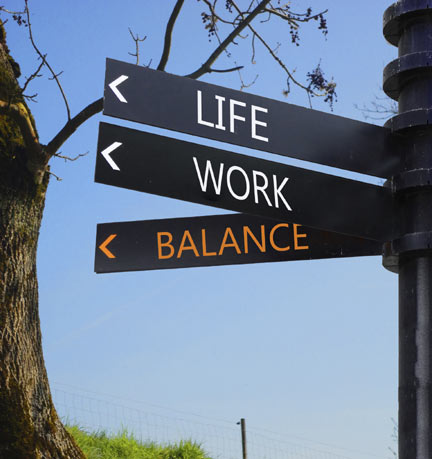
News flash, right?
Still, this unsurprising revelation was confirmed for me this week through the results of the fifth "Today's Professional Woman Report," a national survey of 1,043 male and female professional members of LinkedIn.
The survey, which a press release said was "inspired by conversations on 'Connect: Professional Women's Network,' powered by Citi," found that 78 percent of female respondents reported that they had never heard a successful man talk about the difficulty of having a career and a family.
"Yet results of the study revealed that both men and women rank 'finding the right balance between work and family life' as their top career concern," the press release said. "Over half of men say that they have heard other men engage in conversations about work-life balance, indicating that men may not be opening up about these challenges to women."
Meanwhile, I loudly bang the drum for work-life balance.
I don't know what it takes to be considered a "successful man," but I think I at least approach that designation. So there you go: I'm unusual. But this survey result got me thinking about more than just my own weirdness. As I pondered conversations I have had about work-life balance, it occurred to me that I have had such discussions with women much more frequently than with men.
However, I know that many men think about this issue as much as I do. I have seen them make extraordinary efforts to be active, energetic, engaged and helpful husbands and fathers while also excelling in the office.
I've heard them ask their bosses if they can leave work a few minutes early to coach a child's soccer team or attend a concert or recital. I've talked to them about how they split household duties with their wives to help both parents find balanced lives.
At the same time, I've noticed that the majority of the bloggers and work-life experts I follow are women. They set the tone for the national conversation about the search for balance, and they do a great job.
But if men could chime in more often, too, it would help the cause.
So why don't they?
Damian Davila, writing on the website for Citi's Women & Co., a personal finance resource for women, said he had some theories.
A father of twin boys, Davila wrote that he quit his full-time job at a marketing agency in 2013 to pursue his two dreams of becoming a freelance writer and spending more time with his sons.
"In the Citi/LinkedIn survey, when men were asked about their biggest career regrets, 17 percent said they wished they'd spent less time at work and more time with their families or on personal pursuits," Davila wrote. "Yet corporate America still seems to frown on men seeking flexible work arrangements to spend more time with their kids."
He wrote that he has three theories about men's relative silence when it comes to discussing these kinds of things.
First, he wrote, our media promote a stereotype of the "fumbling, bumbling, clueless dad who, despite his good intentions, fails miserably at the easiest of parenting tasks."
I think Davila is absolutely right about that, and I've been irritated by the same thing.
While I believe my wife has gifts and traits that make her the stronger parent in our home, that doesn't mean I think I'm a failure as a dad.
We both have roles to play, and our family thrives when we're working together.
Davila's second theory is based on findings in the Citi/LinkedIn survey showing that "while men feel more confident about asking for a raise or a promotion, women feel more confident about asking their bosses for time off."
While he wanted to be involved with and supportive of his wife during her sometimes challenging pregnancy, he wrote, it was awkward every time he asked for time off to help her.
"Why is it that when dads ask, we're made to feel as if companies are making a one-time exception or doing us a special favor? A paternity leave, in my case, would have been without pay, so leaving my full-time job was a move toward better work-life balance," Davila wrote.
Finally, he believes that men are stigmatized for seeking flexible work hours.
"A 2013 study in the 'Journal of Social Issues' found that men with flexible work arrangements received lower evaluations than those with traditional ones," Davila wrote. "While both men and women seeking flexible hours received lower evaluations, women were seen as 'warmer and more moral.' In other words, men were penalized at the character level." I would hope that's not the case at this point in time, but I fear he's correct.
That doesn't mean, however, that the situation can't change for the better.
Linda Descano, president and CEO of Women & Co. for Citi, addressed that in the press release about the survey. "It's clear from the findings that men need to be a bigger part of the work-life balance conversation — and that we could all benefit from more communication about a variety of career issues, from the way we promote our work to how much we think we're worth."
I completely agree. And that's why I'll keep shouting from the proverbial rooftop about the importance of work-life balance and arguing that it's good for both employees — whether they're women or men — and the companies at which they work.
After all, people have thought I was unusual for years. At least this way, I'll be weird for a worthy cause.
Comment by clicking here.



 Contact The Editor
Contact The Editor
 Articles By This Author
Articles By This Author